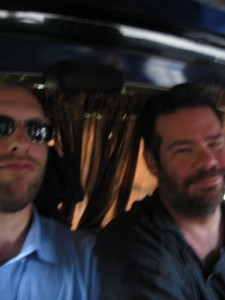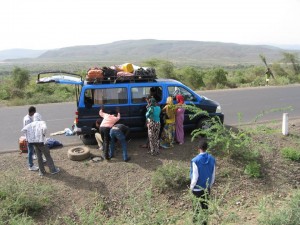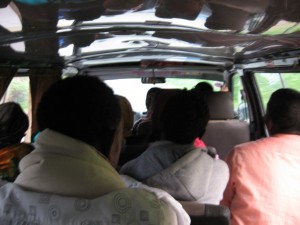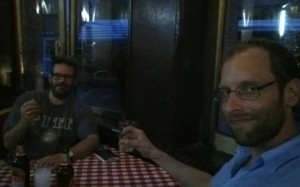There are not a lot of discussions about bus rides. People talk about the great train ride from Venice to Salzburg or the bumpy flight from San Francisco to Detroit. But there doesn’t seem to be an awful lot of discussion about bus rides.
There are several reasons for this. For me, I suppose it’s because on a bus I almost always wish I were in a state of suspended animation. Just like those movies where people jaunt into space and lie in a wet coffin and wake up in a wormhole being eaten by a giant cosmic ant.
Time on a bus shouldn’t be mentionable. What is bus time? Nothing. It’s negative time, a non-time in between a time when you were in one cool place and when you’ll be in another cool place. And so, if bus travel is mentionable, it’s usually because of something negative. On this ten-hour minibus trip from Harar to Addis Ababa, I often wished I were being eaten by that giant cosmic ant.
I am trying to rationalize writing two whole posts about our Ethiopian minibus trip. If you didn’t sit next to a porn star or someone didn’t busjack the vehicle, who the hell wants to read about a bus trip? I read for a while, then sat back, rested, and hated my life. Exciting. The only point I can use to defend my decision is to say that African minibus travel is mentionable.
We set out in the dark predawn hours and Mark and I reach the conclusion that the only benefit of darkness is that we can’t experience the terror of watching the road ahead of us. Our driver’s attitude towards driving bespeaks a dedicated faith in both the minibus’s shocks and in the religious philosophy of fatalism. Since he hits every bump and ditch in the road, we also assume he is playing a game called “The people in the back wronged my mother.”
At 7:30 am, we stop in Asebe Teferi for a thirty minute break. We get out and celebrate our legs and cool morning air. The dirt road in town is busy with people and the minibus becomes the focal point of attention. One of my fellow passengers points me to a seat with a broad smile and says, “Sit!” I thank him, but tell him I’d rather walk around. As the left side of my ass has been numb for an hour and a half, I would like to walk the life back into it. He walks with me and shoos the beggars and children as we walk and chat.
“You do this ride a lot?” I ask.
“Oh yes, very often. My family lives in Harar and I live in Addis.”
“Ah. When do you think we will get to Addis?”
He looks at his watch. “11 o’clock.”
“11 o’clock!” I look at my watch. That’s three more hours. We will be in Addis four hours ahead of schedule. I am overcome with joy. “I can’t believe it’ll be that soon.”
“Soon? No. It’s very long, Addis is very far away.”
I squint. He squints. Something is wrong.
Let’s talk about Ethiopian time. The Ethiopian day literally starts when the day starts. That is, 12 midnight is not the start of a new day, 6 am (when the sun comes up) is the start of a new day and the clock is concurrent with that. So, 6 am is 12 am, 7 am is 1 am, and so on.
As you can imagine, this has led to massive miscues and inconveniences as thousands of tourists have arrived for buses, movies, and trains only to find that they are either six hours early or six hours late.
So, by “11 o’clock” my minibus buddy means “5 o’clock pm” in international time, or, time. It’s only 7:30 am (or 1:30 am, if you’re from Addis) and according to this gent we have another ten hours. I nearly weep. He frowns. As this is my virginal experience with Ethiopian time confusion, I hope to get a T-shirt. If it exists, I imagine that it will depict a frustrated white guy shouting “fuck” into the air with abject despair, because that’s exactly what I did on that dirt road in Asebe Teferi, right in front of a butcher’s shop and a noseless leper begging me for money.
The trip is punctuated by dozens of stops. We stop to buy mangoes, water, and chat (the drug, not the casual discussion, which is often free of charge). We stop when there are too many animals in the road, but in general the driver shows little disregard for the road’s furrier pedestrians. He swings within mere inches of camels, donkeys, goats, sheep, oxen, horses, and cows. It is the first time I have ever been stopped in traffic caused by baboons.
We stop for an uncountable number of military check points. Every five miles or so finds us pulled to the side of the road being ogled by a military officer. We stop for a customs check which involves opening and checking the twenty or so packages tied to the roof.
We stop at some grass huts to buy charcoal. The shepherds are in knitted threadbare shawls. They look in the window at Mark and I with open mouths as they take money for their wares. While I am slightly uneasy, I imagine they are just trying to wrap their heads around our existence, which is exactly what I am doing. Our worlds are so different, our set of burdens, worries, joys. These men have never owned a house key, had a bank account, or worried about pissing off their bosses. A computer virus means nothing to them. They are worried about keeping their kids alive and avoiding the malaria that is rampant in the area. Their concerns today are the potentially life-threatening weather conditions; mine is whether our hotel in Addis has kept our reservation. This line of thinking removes some of the superficial sting of this minibus trip. And as we speed away I curse occasional insight.
We stop for two blown tires – who would have thought that stuffing a minibus to twice its passenger capacity and driving like a lunatic on unpaved roads might have an effect on the tires? One of these occurs in the middle of an endless desert, and clearly marks the most interesting thing that has ever happened to a little boy from a nearby village. He is carrying a thin tree on his shoulder, carrying it to a local town for firewood, like many in the rural areas. When he sees our minibus pull over he drops his tree and runs towards us waving his hands and shouting “Hey! Hey!” When he gets to us he chickens out and squats on a nearby rock to watch the tire repair. He starts shouting and waving again as we pull away, his opportunity gone.
We stop for everything, which is a nightmare to a time-obsessed jerk like myself. In my obsessive mind, there is nothing worse than stopping along a journey. It’s treading water and time wasted. A delayed plane, a restaurant stop on a car trip, or a needless stop on a bus trip grates on my mind. Nevertheless, we stop for everything and I simply have to deal with it.
And we stop for Carlton.
You don’t know Carlton. You have never met Carlton. You will never meet Carlton. So you have to believe me when I say that Carlton is the most annoying person in Ethiopia’s history. Carlton is Carlton because he resembles the character Carlton from the Fresh Prince of Bel Air. He is small and trim, wears a flat top, and has a scruff and goatee. He is rather handsome for a man who makes me want to kill baby ducks.
Carlton made his annoying mark earlier in the morning when he covered his miniature body in quilts, stretched out in the only single seat in the minibus, and whined when interrupted. Throughout the morning Carlton solidifies this persona by becoming an incredibly excitable passenger on the minibus from hell. He squeals, claps his hands, and dances to every song that comes on the radio as though it’s the first time he’s ever heard it. This is impossible, since every Ethiopian song sounds the same. He implores the driver to stop for mangoes and water, and gets the other passengers involved in his personal journey of annoyance.
Mark and I loathe Carlton. It’s not his perky behavior, but rather the juxtaposition of his perkiness and cheer against our malaise and angst. Carlton took the only seat in the minibus one might consider comfortable, and it’s a little hard to be perky when we are four people stuffed into a seat for three. So while Carlton bounces around on his seat in glee, probably able to feel all of his limbs and butt parts, we glare at him with numb asses and tingling fingers. Mark (who at 6’3 is about twelve taller than Carlton) is now in hour five of what we are calling ‘The Suffering of St. Mark the Lanky.”
Despite my dislike of Carlton, I am envious of him and many of the other passengers. The difference in the Ethiopians’ and our outlook on this trip is palpable. We see it as a pain and a chore, a non-time in between two other, more desirable times. For me, it’ll be better when I’m in Addis. By contrast, the Ethiopians see the trip as time like any other time, no better or different from earlier or later, time to be enjoyed and used.
Again, I curse insight.
Insight or no insight, when we pull into the gritty, third-world outskirts of Addis Ababa, I am grateful to the point of tears. They drop us off and after eleven hours, I almost expect some emotion on the part of Carlton, the driver, his assistant, or the big guy who sat in front of us. But no. Our bags are dropped to the ground from the roof and the other passengers walk away. We hoist our backpacks and before we’ve gone ten yards the minibus from hell is gone.
The cab to the hotel takes an hour because of traffic, and Mark and I are certain that we are the butt of a joke. We are quiet on the cab ride and the driver tries to make conversation until he notes our looks of exhaustion.
The hotel has a bar and that is where we spend the rest of our night. We recount the story for each other as if we hadn’t both been there, laugh endlessly and toast Carlton, blown tires, and military check points as we down each chilly shot of Araqi.
As the night in the Ras Hotel in Addis wears on, we nonchalantly refer to the “minibus from hell” because we have been through it and it is our right. We move on to our favorite topics (trip related issues, books, women) but throughout the drunken evening, one of us will laugh, shake his head, and say something like “Carlton! That little prick!” or “Fucking baboon traffic” or “Charcoal!”
The minibus trip from hell is mentionable. And, all in all, I am glad I wasn’t eaten by a giant cosmic ant. But maybe if Carlton was…




